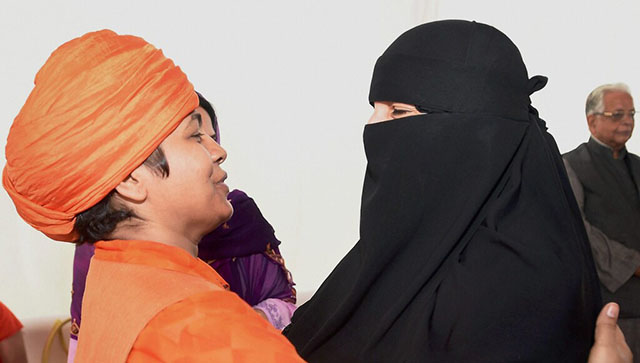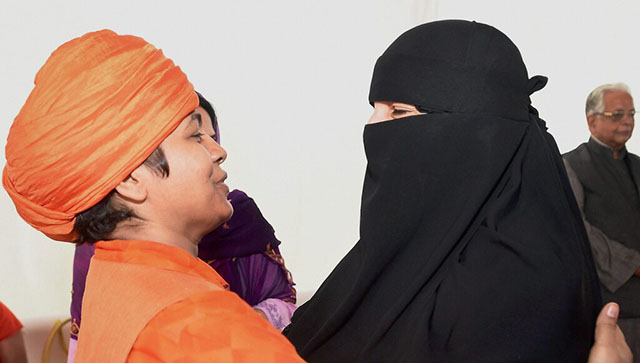By Ila Ananya
The last time we heard a lot of noise from the All India Muslim Personal Law Board (AIMPLB) was in September 2016. They had filed an affidavit to the Supreme Court, announcing in complete seriousness, among other things, that women lacked power and were incapable of making good decisions. At the same time, they said that Shariat (Muslim personal law) permitted triple talaq even though it was a “sin” and the “least appreciated form of ending a marriage.” Since then, they have also declared that they will boycott the National Law Commission’s questionnaire asking for the opinion of people on a Uniform Civil Code (UCC).
However, yesterday on 16 April, for the first time the AIMPLB came out with what appears to many as an unexpected move – they have now called for the “social boycott” of anyone divorcing women instantaneously, ie pronouncing triple talaq in a single sitting.
While the AIMPLB did make it clear yesterday that they still abhor any outside interference in Muslim personal laws, they have released an eight-point code that includes the argument that talaq must ‘ideally’ be pronounced over three months. The idea, they say, is that three months would be a good time for couples to try and settle differences within themselves (since they called marriage a “permanent and stable relationship”) or by involving other family members. Basically, it’s a “waiting period” — plenty problematic in itself. But that’s not all of it.
While some parts of the media have been impressed by what looks like a pivot, Muslim women who have been involved in the long and difficult fight to ban triple talaq are distinctly unimpressed. They say strongly that this tiny step will do very little in the larger scheme of things.
“This has been happening for so many years; it’s not a new problem. It took them [AIMPLB> so long, and took so much effort by women to really scream at the top of our voices for them to hear this,” says Noorjehan Safia Niaz, co-founder of the Bharatiya Muslim Mahila Andolan (BMMA). Then she argues forcefully, “But what is the point if they say it is wrong but valid?” The need, it seems, is for a categorical ban on triple talaq, rather than a flip-flop of indecision—if the AIMPLB has suddenly woken up to the difficulties Muslim women face, then their awakening needs to actually shift something.
The infuriating thing, as Mariya Salim of the BMMA points out, is that the AIMPLB, while making statements about social boycott, also ridiculously compared talaq via SMS to an invitation card. Maulana Mohammad Wali Rahmani, general secretary of the AIMPLB, reportedly said that the comparison was that the wedding invitation card is considered enough to convey the message instead of a personal invitation. So the triple talaq is like an efficient little SMS, get it? This makes it a rather comfortable middle ground for the AIMPLB to occupy, essentially seeming like they’re saying something new while bothering nobody in particular, except Muslim women who want change. Salim says the AIMPLB’s decision is a reflection of privilege and power: “When I have privilege, why will I give it up?” she asks.
Both Salim and Hasina Khan, founder-member of Bebaak Collective, an umbrella of Muslim women’s groups that has previously criticised both triple talaq and the AIMPLB’s patriarchal statements, further push the AIMPLB’s idea of “social boycott”. “Who will ever do a social boycott?” Khan asks laughing incredulously. Instead, she says, the focus needs to be on the legal system. Salim angrily points out, “You think social boycott affects a rich family?” After all, just today we also heard of a horrifying case where a woman from Uttar Pradesh was attacked with acid by her in-laws because she had contested her husband’s divorce (married to for 18 years) by instantaneous triple talaq.
In its eight-point memo, the AIMPLB also argued that they would ask masjids to make announcements about the social boycott and spread awareness about the problem with instant talaq. But is this enough? Niaz, who has been calling for a codification of Muslim law, suggests that it isn’t. “It’s true that awareness can have its own impact, but a legislation is a legislation — if awareness was enough, we wouldn’t require any laws. Legislation is necessary because if despite all awareness, people still do this, there needs to be some method of recourse available to women,” she says.
“Women organisations like BMMA among others have been extremely vocal in their stand on Muslim women rights, and when one compares their work with all male-led organisations like yourself in furthering the rights of Muslim women, there is little doubt as to who should lead the movement for reform in the Muslim community,” Salim wrote last year in an open letter to the AIMPLB. Now, a year later, the fight remains, as does the importance of her statement, because we still desperately need to be listening to what Muslim women are saying.
The Ladies Finger (TLF) is an online women’s magazine delivering fresh and witty perspectives on politics, culture, health, sex, work and everything in between.


)




)
)
)
)
)
)
)
)